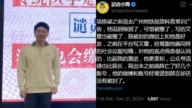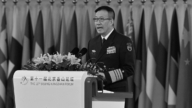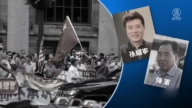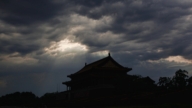【新唐人2013年07月15日訊】中共新任領導人習近平、李克強上臺至今已有半年多,他們的執政走向日益引發外界關注。最近有大陸資深媒體人向外媒分析說,目前中共高層在幻想走一條與當年納粹德國類似的「國家社會主義之路」。但中共近10年來暴力維穩打壓出的7種新生反對力量,已經讓中共陷入重重危機。下面請看報導。
日前,大陸資深媒體人、原《中國改革》雜誌社社長李偉東在接受《法國國際廣播電臺》採訪時表示,中國問題的根源是政治體制,但中共並不想進行改變,而是習慣採用高壓方式來「維穩」,這使得中國大陸成為一個民怨沸騰的高壓鍋。最近10年來中共至少打壓催生了7種新的反對力量,問題十分嚴重。
這7種反對力量包括:
一、多達幾千萬的失地農民。
二、退伍轉業軍人。
三、宗教反對力量。
四、邊疆少數民族地區的反抗力量。
五、強拆、司法冤案以及下崗帶來的大量上訪人員。
六、不能充分就業的大學畢業生。
七、知識界。
原首都師範大學教育科學學院副教授李元華:「由於中共暴政的肆無忌憚,對各級百姓的迫害,使得大部分國民逐漸的覺醒,覺得不能再逆來順受了。所以他們有一種意願,要反抗這個暴政。」
深圳政論專欄作家朱健國也談到,1999年以來,中共加強了對傳媒的控制,這是新型反對力量產生的關鍵原因之一。
深圳政論專欄作家朱健國:「現在的關鍵問題就是要首先放開媒體、輿論、網路,但是他們現在還想把微博甚麼都控制死,這都是自己給自己來添油加火。」
《法廣》報導,習近平上臺半年來,中國的政治、經濟兩個領域出現不同的左右兩個方向,李克強大力推動自由主義市場經濟改革,但在政治領域,習近平推出的「夢論」、 「鞋論」和「三個自信」等說法,卻明顯帶有國家主義、民族主義的傾向。這說明「習李體制」還沒有形成,也說明在習近平的政改理念中,並無普世價值,政改目地無非是「加強黨的領導」。
對此,中國社會問題研究人士張健向《新唐人》表示,實際上,中共一直在不斷變換花樣進行「政改」,但只要維持「一黨獨裁」,政改之路就根本走不通。
旅美中國社會問題研究人士張健:「無論習近平提出甚麼各種各樣的論調都走不通。因為中共建政以來的無數次運動都是一種政改,我們都認為可以叫做一個政改,包括文化大革命,它也是一種政改。」
原「首都師範大學」教育科學學院副教授李元華也認為,目前對於習近平來說,實際上沒有別的選擇,只能是順應解體中共的歷史潮流。
李元華:「任何所謂的維護這個政黨、使這個政黨去延續,或者使得他自己的最高統治得以鞏固,跟各利益集團角鬥廝殺或者是利益交換,都是沒有結果的。」
《法廣》的報導還表示,習近平希望延續共產黨執政和未來10年的平穩。中共目前走的是國家主義加民族主義的所謂「紅色帝國之路」,也就是納粹德國上世紀30年代的「國家社會主義之路」。李偉東強調指出,實際上這條路是走不通的,因為中共不願順應潮流進行根本的政治變革,這也使中國經濟的危機將不斷加重,社會前景堪憂。
採訪/易如 編輯/李謙 後製/李智遠
RFI: Seven Newborn Opposition Forces Are Born In China
The path to be taken for Xi Jinping and Li Keqiang has
become a focus of pubic attention in China and overseas.
Reportedly, China’s media professionals think that
the Chinese Communist Party(CCP) leadership seems
to be taking a road to National Socialism,
as Nazi Germany did, under Adolf Hitler.
In the past 10 years, the CCP’s violent suppression
has given rise to seven newborn domestic opposition forces.
China, in reality, has gotten bogged down in heavy crises.
Li Weidong, ex-president of China Reform magazine,
recently tells Radio France Internationale (RFI) that
the political system is the root cause of China’s problems.
Li points out that the CCP hasn’t really
launched its promised reform.
Instead, it gets used to using violence
to achieve “stability".
However, the approach has made Chinese society
a pressure cooker of resentment.
This has engendered seven new opposition forces
in the last 10 years, this is serious trouble, says Li.
The category covers the following seven opposition forces:
1. several tens of millions of landless peasants;
2. demobilized soldiers; 3. religious dissidents;
4. resistance forces in frontier minority areas;
5. large numbers of petitioners, provoked by forced
demolitions, judicial injustice, and laid-off workers;
6. underemployed college graduates;
7. intelligentsia.
Scholar of Chinese history, Li Yuanhua: “The CCP’s
tyrannical persecution has victimized the masses.
The public has now come to awaken, with a growing
disobedience, and a will to resist this tyranny."
Shenzhen-based columnist, Zhu Jianguo, comments.
Since 1999, the CCP has increased media control.
This is a contributing factor that has given rise to
new opposition forces, he says.
Zhu Jianguo:"It is now important to lift the ban on media
and the internet, and to allow freedom of expression.
But on the contrary, they now want to
control micro-blogging even more tightly.
All of these actions are only going to
speed up the demise of the regime."
RFI comments that, after Xi Jinping took over as President,
the paths of development in political and
economic areas have been taken differently.
Premier Li Keqiang has vigorously promoted
liberal market reforms.
Whilst politically, Xi has indulged in “Chinese Dream"talk,
The"If the Shoe Fits"speech,
and the “Three Self-confidences"theory.
His advocacies have shown the character of
statism and nationalism.
This means that a “Xi-Li System"
has not yet been formed.
It also illustrates clearly that Xi’s reform
idea doesn’t contain universal values.
The goal of his political reform is only to “reinforce
the Party’s leadership", according the RFI report.
Zhang Jian, researcher on China issues, says that the
regime has kept on varying the so-called “political reform".
If the CCP’s dictatorship is premised, its “political reform"
will never be feasible, he remarks.
Zhang Jian: “It won’t work no matter how Xi
puts forth his arguments.
The political movements launched by the CCP for
decades in China can all be called political reforms.
One of them, the Cultural Revolution,
was just another form of political reform."
Li Yuanhua agrees that Xi Jinping’s only way out is to
disintegrate the CCP, and to thus follow history’s trends.
Li Yuanhua: “It’s futile to make an effort to keep CCP rule.
So it will be fruitless to battle with privileged groups
for political power or for political trade-offs."
RFI also reports that Xi Jinping hopes that CCP rule
shall continue and even stabilize in the next 10 years.
RFI calls it “a path of the red empire",
featuring statism, with nationalism.
This is the same road of National Socialism,
adopted by Nazi Germany in the 1930s.
Li Weidong warns that history shows us that
it is a dead-end path.
Doing nothing about political reform will
worsen China’s economic crisis, he says,
and China may well face
progressively tougher times ahead.






























